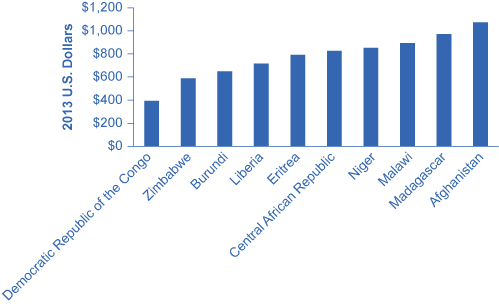| << Chapter < Page | Chapter >> Page > |
It is worth pausing a moment to marvel at the growth rates of the East Asian Tigers. If per capita GDP grows at, say, 6% per year, then you can apply the formula for compound growth rates—that is (1 + 0.06) 30 —meaning a nation’s level of per capita GDP will rise by a multiple of almost six over 30 years. Another strategy is to apply the rule of 72. The rule of 72 is an approximation to figure out doubling time. The rule number, 72, is divided by the annual growth rate to obtain the approximate number of years it will take for income to double. So if we have a 6% growth rate, it will take 72/6, or 12 years, for incomes to double. Using this rule here suggests that a Tiger that grows at 6% will double its GDP every 12 years. In contrast, a technological leader, chugging along with per capita growth rates of about 2% per year, would double its income in 36 years.
Many economically-challenged or low-income countries are geographically located in Sub-Saharan Africa. Other pockets of low income are found in the former Soviet Bloc, and in parts of Central America and the Caribbean.
There are macroeconomic policies and prescriptions that might alleviate the extreme poverty and low standard of living. However, many of these countries lack the economic and legal stability, along with market-oriented institutions, needed to provide a fertile climate for domestic economic growth and to attract foreign investment. Thus, macroeconomic policies for low income economies are vastly different from those of the high income economies. The World Bank has made it a priority to combat poverty and raise overall income levels through 2030. One of the key obstacles to achieving this is the political instability that seems to be a common feature of low-income countries.
[link] shows the ten lowest income countries as ranked by The World Bank in 2013. These countries share some common traits, the most significant of which is the recent failures of their governments to provide a legal framework for economic growth. Ethiopia and Eritrea recently ended a long-standing war in 2000. Civil and ethnic wars have plagued countries such as Burundi and Liberia. Command economies, corruption, as well as political factionalism and infighting are commonly adopted elements in these low-income countries. The Democratic Republic of the Congo (often referred to as “Congo”) is a resource-wealthy country that has not been able to increase its subsistence standard of living due to the political environment.

Low-income countries are at a disadvantage because any incomes received are spent immediately on necessities such as food. People in these countries live on less than $1,035 per year, which is less than $100 per month. Lack of saving means a lack of capital accumulation and a lack of loanable funds for investment in physical and human capital. Recent research by two MIT economists, Abhijit Bannerjee and Esther Duflo , has confirmed that the households in these economies are trapped in low incomes because they cannot muster enough investment to push themselves out of poverty.

Notification Switch
Would you like to follow the 'Principles of economics' conversation and receive update notifications?